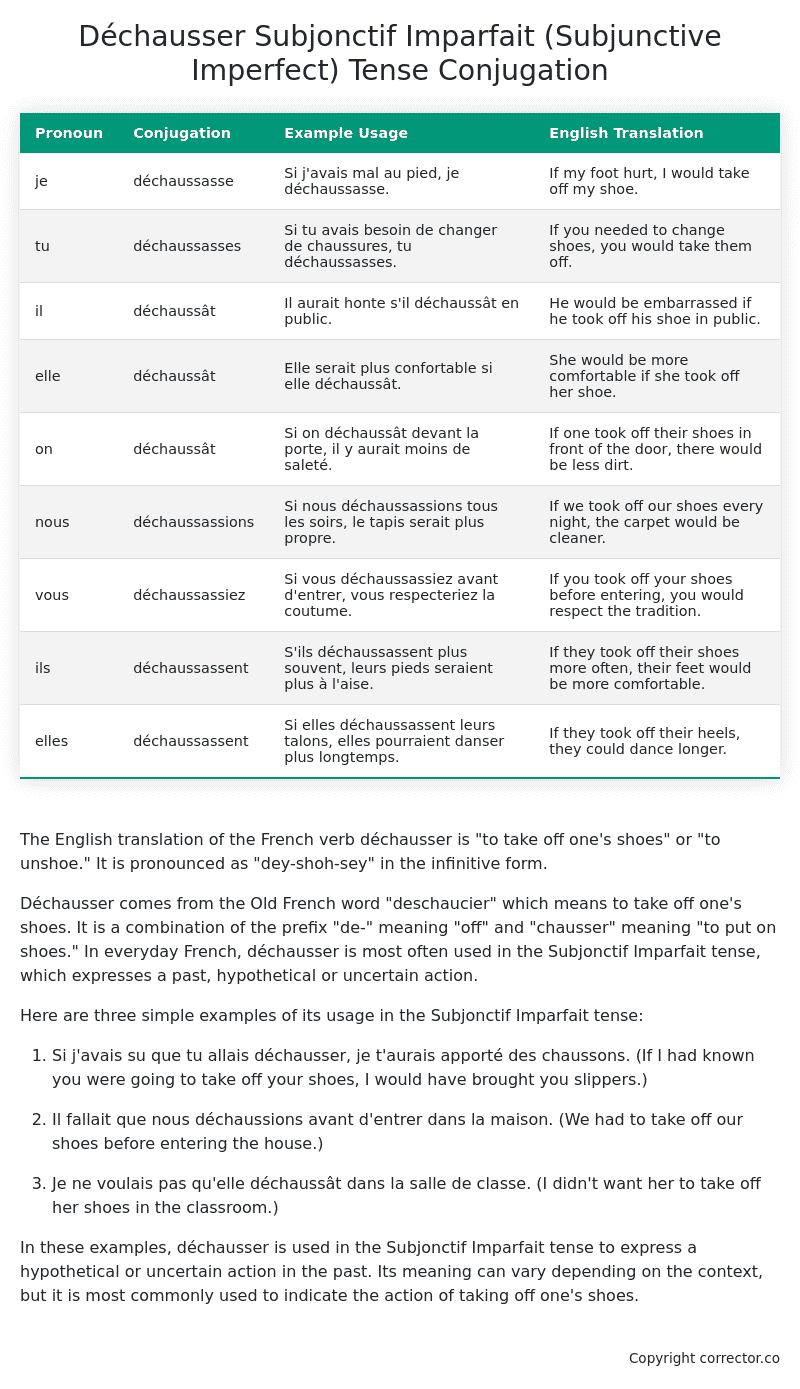Subjonctif Imparfait (Subjunctive Imperfect) Tense Conjugation of the French Verb déchausser
Introduction to the verb déchausser
The English translation of the French verb déchausser is “to take off one’s shoes” or “to unshoe.” It is pronounced as “dey-shoh-sey” in the infinitive form.
Déchausser comes from the Old French word “deschaucier” which means to take off one’s shoes. It is a combination of the prefix “de-” meaning “off” and “chausser” meaning “to put on shoes.” In everyday French, déchausser is most often used in the Subjonctif Imparfait tense, which expresses a past, hypothetical or uncertain action.
Here are three simple examples of its usage in the Subjonctif Imparfait tense:
-
Si j’avais su que tu allais déchausser, je t’aurais apporté des chaussons. (If I had known you were going to take off your shoes, I would have brought you slippers.)
-
Il fallait que nous déchaussions avant d’entrer dans la maison. (We had to take off our shoes before entering the house.)
-
Je ne voulais pas qu’elle déchaussât dans la salle de classe. (I didn’t want her to take off her shoes in the classroom.)
In these examples, déchausser is used in the Subjonctif Imparfait tense to express a hypothetical or uncertain action in the past. Its meaning can vary depending on the context, but it is most commonly used to indicate the action of taking off one’s shoes.
Table of the Subjonctif Imparfait (Subjunctive Imperfect) Tense Conjugation of déchausser
| Pronoun | Conjugation | Example Usage | English Translation |
|---|---|---|---|
| je | déchaussasse | Si j’avais mal au pied, je déchaussasse. | If my foot hurt, I would take off my shoe. |
| tu | déchaussasses | Si tu avais besoin de changer de chaussures, tu déchaussasses. | If you needed to change shoes, you would take them off. |
| il | déchaussât | Il aurait honte s’il déchaussât en public. | He would be embarrassed if he took off his shoe in public. |
| elle | déchaussât | Elle serait plus confortable si elle déchaussât. | She would be more comfortable if she took off her shoe. |
| on | déchaussât | Si on déchaussât devant la porte, il y aurait moins de saleté. | If one took off their shoes in front of the door, there would be less dirt. |
| nous | déchaussassions | Si nous déchaussassions tous les soirs, le tapis serait plus propre. | If we took off our shoes every night, the carpet would be cleaner. |
| vous | déchaussassiez | Si vous déchaussassiez avant d’entrer, vous respecteriez la coutume. | If you took off your shoes before entering, you would respect the tradition. |
| ils | déchaussassent | S’ils déchaussassent plus souvent, leurs pieds seraient plus à l’aise. | If they took off their shoes more often, their feet would be more comfortable. |
| elles | déchaussassent | Si elles déchaussassent leurs talons, elles pourraient danser plus longtemps. | If they took off their heels, they could dance longer. |
Other Conjugations for Déchausser.
Le Present (Present Tense) Conjugation of the French Verb déchausser
Imparfait (Imperfect) Tense Conjugation of the French Verb déchausser
Passé Simple (Simple Past) Tense Conjugation of the French Verb déchausser
Passé Composé (Present Perfect) Tense Conjugation of the French Verb déchausser
Futur Simple (Simple Future) Tense Conjugation of the French Verb déchausser
Futur Proche (Near Future) Tense Conjugation of the French Verb déchausser
Plus-que-parfait (Pluperfect) Tense Conjugation of the French Verb déchausser
Passé Antérieur (Past Anterior) Tense Conjugation of the French Verb déchausser
Futur Antérieur (Future Anterior) Tense Conjugation of the French Verb déchausser
Subjonctif Présent (Subjunctive Present) Tense Conjugation of the French Verb déchausser
Subjonctif Passé (Subjunctive Past) Tense Conjugation of the French Verb déchausser
Subjonctif Imparfait (Subjunctive Imperfect) Tense Conjugation of the French Verb déchausser (this article)
Subjonctif Plus-que-parfait (Subjunctive Pluperfect) Tense Conjugation of the French Verb déchausser
Conditionnel Présent (Conditional Present) Tense Conjugation of the French Verb déchausser
Conditionnel Passé (Conditional Past) Tense Conjugation of the French Verb déchausser
L’impératif Présent (Imperative Present) Tense Conjugation of the French Verb déchausser
L’infinitif Présent (Infinitive Present) Tense Conjugation of the French Verb déchausser
Struggling with French verbs or the language in general? Why not use our free French Grammar Checker – no registration required!
Get a FREE Download Study Sheet of this Conjugation 🔥
Simply right click the image below, click “save image” and get your free reference for the déchausser Subjonctif Imparfait tense conjugation!

Déchausser – About the French Subjonctif Imparfait (Subjunctive Imperfect) Tense
Formation
Common Everyday Usage Patterns
Interactions with Other Tenses
Subjonctif Présent
Indicatif Passé Composé
Conditional
Conditional Perfect
Summary
I hope you enjoyed this article on the verb déchausser. Still in a learning mood? Check out another TOTALLY random French verb conjugation!


